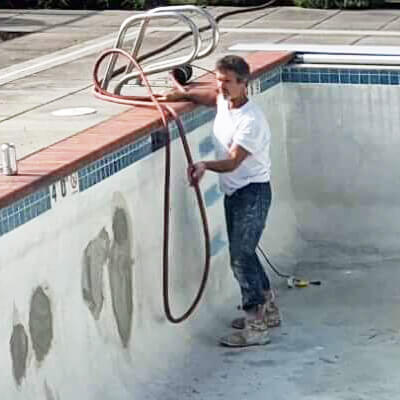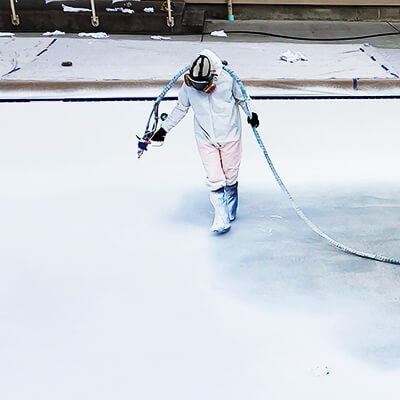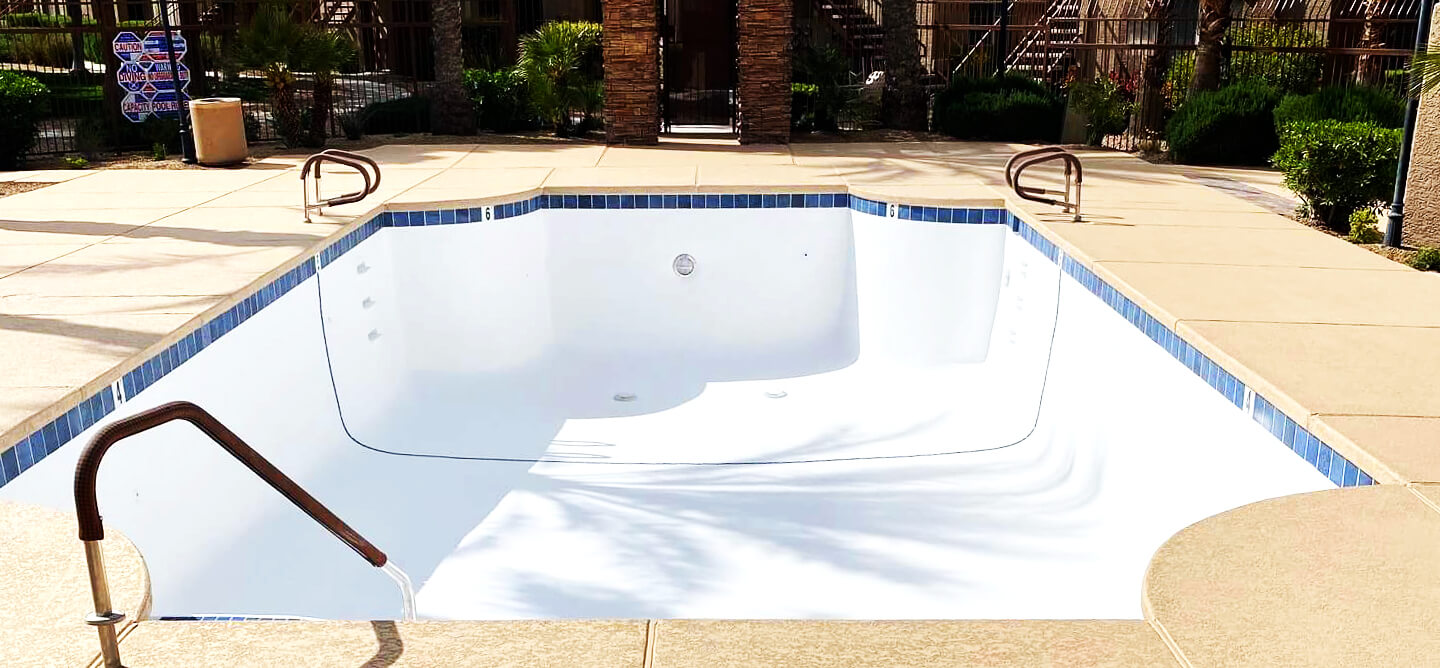Call Aqua-Spray at (514) 225-1988 for more information or to schedule an appointment.
Coatings
don't last forever
Depending on the coating you have, yours may last longer than some others. But eventually, every pool's finish will wear, chip or peel. This is where Glasscoat gets interesting.

When it's time to redo a pool liner, there are more options than ever. Paint used to be the standard material and probably one of the most used. Then there are the cementitious type coatings with aggregates which are also used on occasion, which are enjoying some popularity, BUT now there is a better option gaining ground: Glasscoat. Swimming pools lined with cementitious materials are difficult to repair - repairs often peel off in a relatively short time. Even the color of pool resurfacing material can be difficult to match, causing your pool to look mottled, stained, or simply poorly repaired.
When plaster is applied incorrectly, it can be in layers as thin as ⅛ inch. This means that within 3-5 years there may be peeling, chipping and other surface issues. The National Cementitious Coatings Board has spent a great deal of time and effort studying the problems associated with the resurfacing of this cementitious material, as it has been a recurring problem for a long time. This is why Glasscoat is the material of choice for commercial pools.
When paint is used, the type of paint will vary the frequency of painting required. The lifespan of a paint is about 5 years (epoxy). The disadvantage is that each time you have to redo a sandblast, even a light one, before applying a new layer. These are expenses that turn out to be quite costly over time, not to mention the damage to the concrete if the painting is not done in time to prevent the concrete from soaking up water full of chemicals (salt, chlorine, etc).

Several other materials are offered in the market, but are not good.
The latter are equivalent to paints given their low strength and thinness.
Fairly thin rubber type coating that peels, cracks and flakes over time approximately 7 years after installation. The problems appear as much on the stairs as on the surfaces of the swimming pool. Many of our customers have had to remove it in order to renovate their pool in a more sustainable way since installers cannot repair it.
Other coatings are not up to par with our harsh climates. Very thin once again, it comes off in a cake just a few years after the date of application.
Very low strength coatings and tends to peel easily on edge surfaces. Repairs adhere poorly to each other and always tend to come apart. This coating lasts about 6-7 years on average. It stains easily if you walk in your shoes or if you clean your pool in the spring, you have to be very careful not to damage, mark or stain the coating.
A downside of these coatings is that they are not solid colors and no paint or other coating can be used to make a lasting repair without it being apparent. GlassCoat has the advantage of being a solid color and is easily repairable by applying a brush or roller stroke if necessary.
In commercial applications, installing or resurfacing with Glasscoat is cost effective due to lower maintenance costs, fewer chemicals needed to maintain the pool and greater durability. Now, Glasscoat is starting to take hold in residential applications.

What is the difference?

The question then becomes “why use a cementitious material or paint”? Well frankly, there is no right answer. Glasscoat is simply the best choice for resurfacing swimming pools. Glasscoat is:
Easy to apply, requires only three people.
Very low value for money.A very fast spray application
1000 sq. ft. in 90 minutes.Up to 20 years expected life.
Does not require periodic maintenance.Benefits
Applicators of cementitious coatings do not have standards to respect
Applicators of cementitious coatings are not necessarily required to meet any standards. So too often made below the required standards, poorly mixed materials, variable quality and poor quality installation can go unnoticed at the end of the installation. Thickness, moisturizers, adjuvants, modifiers, bonding agents, specifications and skill levels vary from contractor to contractor. It's also a competitive field, so entrepreneurs may have an incentive to cut corners.
GlassCoat: a first choice material
Glasscoat is subject to specific industrial standards and the basic quality is very high. Many people base their choice solely on short-term factors. But in the long run, Glasscoat is a better choice on all counts. When Aqua-Spray performs resurfacing, we show our quality products to the customer in advance so they know exactly what to expect. No surprises. No hidden fees. No cut corners.
If you want a strong, durable and exceptional finish that won't break in years, Glasscoat is the way to go. Contact us and we will review your pool resurfacing project.


